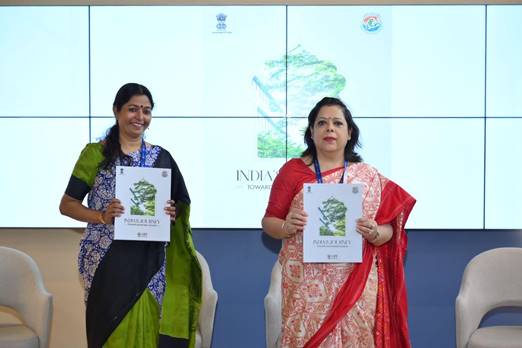
|
Getting your Trinity Audio player ready...
|
Secretary Leena Nandan of the Ministry of Environment, Forest and Climate Change has emphatically highlighted India’s proactive stance in achieving climate targets, particularly in sustainable cooling initiatives, during her address at the UNFCCC COP 28 in Dubai.
India’s commitment to reducing emission intensity stands as a testament to its proactive approach towards combating climate change. Initially setting an ambitious target of 33-35% reduction by 2030, India’s remarkable progress in this endeavour has surpassed expectations. By achieving a 33% reduction in emission intensity of GDP by 2019, the nation has not only showcased its dedication but has also demonstrated tangible results ahead of schedule.

Ms Nandan highlighted India’s continued efforts to scale up climate ambitions, acknowledging the global need for more substantial action to combat climate change. She underscored India’s dual focus on economic growth and environmental sustainability, exemplified through initiatives like the India Cooling Action Plan (ICAP).
Highlighting the importance of research into cooling technologies suitable for Indian climatic conditions, the Secretary emphasised the need for industry collaboration to expedite the adoption and scaling up of these advancements.
“India needs to bolster efforts to research on coolants that would be most appropriate to Indian climatic conditions,” Ms Nandan was quoted as saying.
India’s approach, she stressed, is centred on responsible and sustainable growth, setting the narrative for responsible economic expansion while maintaining ecological balance. The government’s commitment to implementing pioneering solutions was highlighted, inviting industry stakeholders to join in making India a global leader in cooling technologies.
The event also showcased India’s achievements in meeting targets under the Montreal Protocol, particularly in creating a sustainable cooling ecosystem, essential for environmental stability. Integrated approaches were prioritised to achieve sustainable cooling across various sectors, such as residential, commercial, cold-chain, and transport, anticipating increased cooling demands with the country’s economic growth.
India’s proactive measures, such as the phase-out of ozone-depleting substances like HCFCs well ahead of Montreal Protocol schedules, were highlighted. The country has been a pioneer in adopting non-Ozone Depleting Substances and low Global Warming Potential technologies, demonstrating its commitment to environmental preservation.
Additionally, the session included insights from industries and implementing agencies like UNDP, UNEP, and GIZ, emphasising collaborative efforts for the success of initiatives under the Montreal Protocol.
The comprehensive approach outlined during the event underscores India’s technological advancements, collaborative spirit, and unwavering commitment to sustainable cooling, positioning the nation as a trailblazer in climate-conscious technological solutions.
In India, the aspirations for sustainability transcend mere good ideals – they are embedded into the fabric of a visionary roadmap, ambitions designed to harness technology’s immense potential. This merging of innovation and environmental stewardship defines the nation’s commitment to redefining the trajectory of sustainable development.
Through a multifaceted approach, India seeks to leverage technological advancements to address critical sustainability challenges. From renewable energy initiatives and smart city development to the conservation of biodiversity and the adoption of eco-friendly practices in industries, the nation aims to create a blueprint where progress harmonizes with the planet’s well-being.
OpenGov Asia reported that, in a significant stride towards technological innovation and sustainable development, the Department of Scientific & Industrial Research (DSIR) and The Energy and Resources Institute (TERI) have joined forces to revolutionise India’s construction and wastewater treatment sectors.
This pioneering collaboration under the “Access to Knowledge for Technology Development and Dissemination (A2K+) Studies” Scheme of DSIR is aimed at aligning with India’s Smart Cities Mission and its ambitious commitment to achieving net-zero emissions by 2070.
DSIR’s allocation of two crucial research studies to TERI signifies a pivotal step in bridging the informational gap on advanced building materials, designs for energy efficiency, and the assessment of membrane-based sewage wastewater treatment systems for reuse and recycling.
















